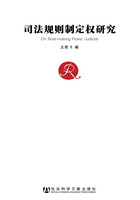
Abstract
The book reckons that judicial rules generally refer to the collective term for substantive rules and procedural rules that have been formulated by the supreme courts during the judicial process. From a global perspective, there exist various forms of judicial rule-making power with different ranges in supreme courts in most countries and regions. Among them, judges in Continental European countries and regions(mainly judges of supreme court)usually fill up legal loopholes through legal interpretation thereby accomplishing the further development of law, which includes initiatives of substantive rules. However, Anglo-American common law itself is the judges' creation. “Stare decisis” and “distinguishing methods” provide strong support for the stability and flexibility of law. Meanwhile, whether it is in Continental European countries and regions and Anglo-American law countries and regions, based on the requirements of judicial independence and autonomy, and according to the authorization of constitution or law, their courts(mainly supreme courts)all enjoy initiatives of procedural rules. On the premise that China fully respects legislative powers and distinguishes it from judicial interpretation powers, and endows Supreme People's Court with certain judicial rule initiatives, China can further achieve that “there are laws to go by” and judgments are made with evidence, through which China can promote judicial justice. It also plays a pivotal role in properly exercising powers of judicial interpretation, improving existing legislation as well as realizing the ideal of the rule of law.
In the introductory section, the author provides a brief account of the origins and significance of the topic, comments on the status quo of this research in China and abroad, and the main problems on the topic. The conclusion sections of the dissertation gives a brief summary, on this subject may be involved in related issues were roughly discussed. The specific contents of each chapter are as follows:
Chapter 1 of the dissertation is a concise explanation of the concept of judicial rule-making power. By analyzing the connotation and essence of justice and jurisdiction, the dissertation points out that justice is not only the process of application of law, but also the process of making judicial rules. In the past and now, the court performs its functions without law. It is necessary and reasonable to make rules by the supreme courts when the current regulations have loopholes, lag and contrary to justice. Judicial rules and the legal explanation are different from the dependence and objective to the law.
The intention of chapter 2 is to study the general history of the judicial rule-making power. A brief history of study shows that whether in the major countries and regions of Continental European law systems, or in the main countries and regions in Anglo-American legal systems, the supreme courts have different forms and scope of judicial rule-making power. Since the founding of the New China, the Supreme People's Court has created a large number of judicial rules by judicial interpretation and other form of the documents.
Chapter 2 deals with the foundation of the establishment of the judicial rule-making power. From the perspective of the practice of ruling by law, the law system is constructed by human with limited rationality, therefore, it is always defective; and from the point of view legal norms, the judiciary cannot refuse to referee; In terms of the expectations of the public, the justice must be just; Based on the requirements of judicial independence and autonomy, it is necessary to confer the power to create rules on the highest courts.
Chapter 4 analyzes the main function of the judicial rule-making power. In the author's view, the judicial rule-making power can promote the uniform application of laws, enhance the level of protection of national rights and interests, promote the generation of law and enhance the functions of the Court.
Chapter 5 is about building the system of the judicial rule-making power. The author specified the operating realities of the judicial rule-making power in China, comparatively analyzed the variety of ways of establishing the judicial system in foreign countries, then proposed specific programs about the judicial rule-making power in China.
Key Words: Jurisdiction; Civil Jurisdiction; Judicial Rule;Legal explanation; Rule-making